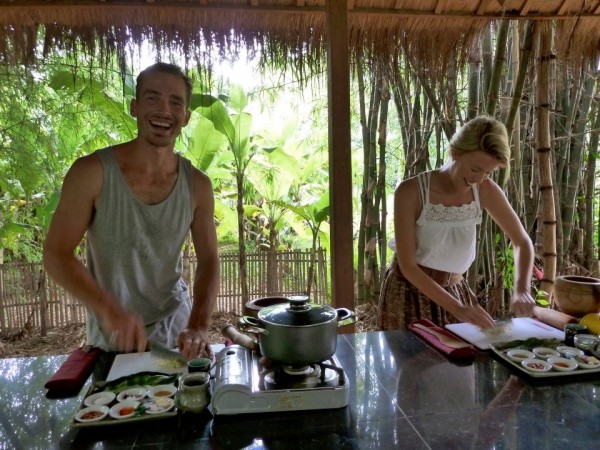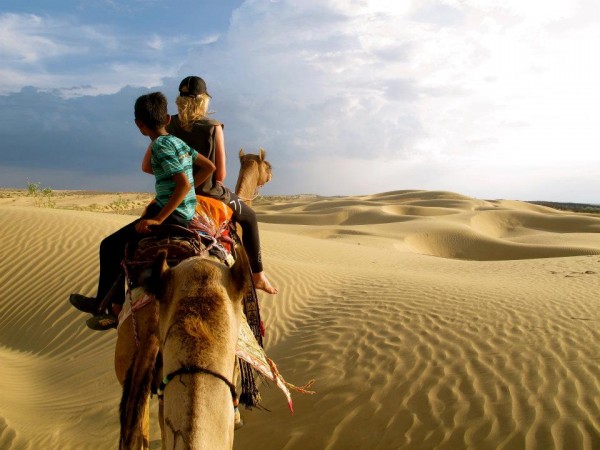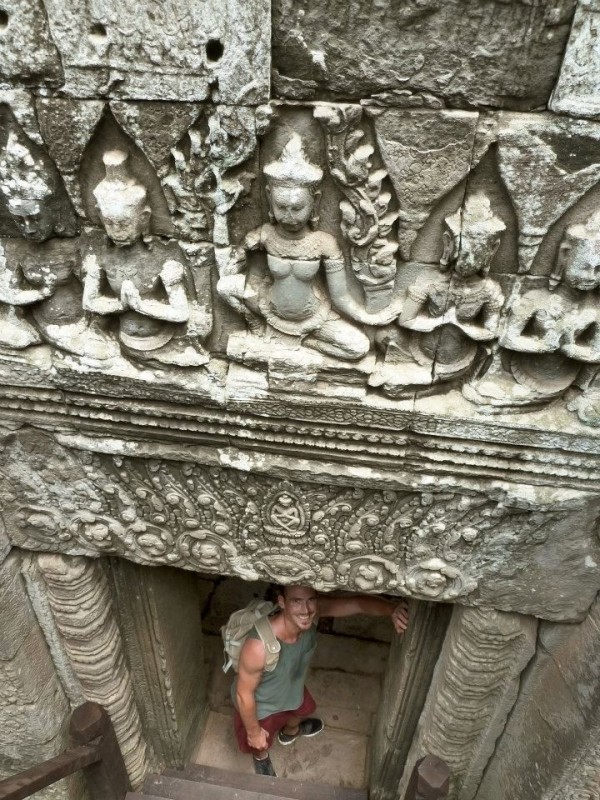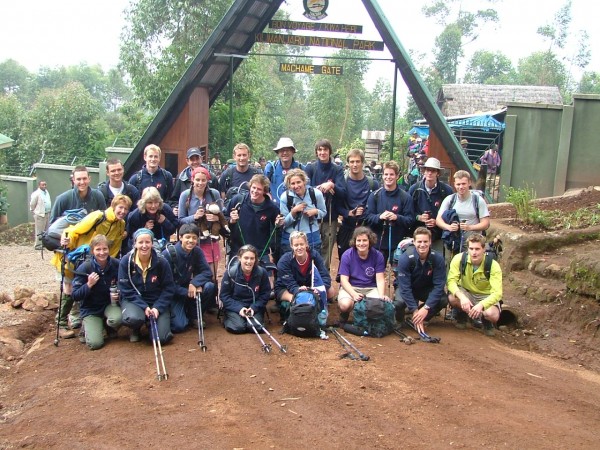‘GROUP TRAVEL’ has become a byword for the lazy, frightened, and inexperienced traveler. It conjures the stereotype of a ‘packaged’ experience — a commodity — letting tourists off the hook from the ‘burden’ of independent travel.
For a long time I was an independent travel snob. A lone wolf, a headstrong, know-it-all, adventure-and-backstreet addict, who could think of nothing worse than arriving in a small village in Peru in a shiny white tour bus and being ushered like livestock through a local market.
But a recent group tour in the Peruvian Amazon caused me to ponder: Might travel experiences be better shared among a small group of like-minded individuals? Here are 12 reasons why the answer is yes.
1. You’ll gain valuable local knowledge.
Laughing up a storm on a group food tour, Siem Reap Province, Cambodia
In my 14 years of traveling, I have never regretted hiring a guide at a heritage site or for a nature trek. The expertise of a good local guide is priceless. From pinpointing off-road diners, music venues, reading spots, gardens, and beaches, to having stories to complement each location, experienced group leaders have evolved tourism from ‘ticking off’ sightseeing boxes to a more interactive cultural experience.
After four years of working in Cambodia as an anthropologist, I had bypassed hiring a guide at local sites, thinking I was enough of an ‘expert’ on the region. It wasn’t until my family came to visit that I hired a local tour company. I was astonished at the magnitude of in-depth historical information I learnt about Khmer culture, family life, and customs from a local’s perspective.
2. You can save money.
Paying up front for group travel can be daunting but may actually save you some coin in the long run. In 2006, my little brother and I decided to deviate from our ‘milk run’ route through Malaysia — Kuala Lumpur to the Perhentian Islands — and make a pit-stop in the Cameron Highlands. We were thrifty students in those days; traveling independently meant we could cut corners and keep our budget in check. But after a few too many karaoke-beers in KL’s Chinatown, Chris and I stumbled into the office of a tour company.
I was adamant this was not the path for us, convinced we were about to get swindled. Chris told me to hear the salesperson out. After punching in various calculations, I swallowed my pride and admitted that we would save 30% by traveling with a group. The package included transfers, meals, accommodations, and activities, sold collectively at a reduced cost. Group travel harnesses the power of buying in bulk, and spreads the cost of guides, ground transportation, and other items across the whole group, giving you more experience per dollar.
3. You can relax.
Independent travel can be a worrisome job. Whenever you venture off the beaten track to countries where visas are complicated and access difficult — especially when you have limited time — organized group travel can be the most sensible route to follow. Navigating red tape on your own can be exhausting, especially when you don’t know the language or customs.
On the Southeast Asian leg of a one-year sabbatical, my partner and I joined an educational group tour exploring indigenous communities in Northern Laos. The company negotiated our visas and transfers at the Thai/Laos border. We received VIP treatment, skipped lines, and sailed through immigration. The hassle of organizing transport and negotiating on transfer rates was eradicated, allowing us to actually enjoy the place.
4. You’ll maximize your precious time off.
Camel trek through the deserts of Northern Rajasthan, India
Vacation time is a commodity. Packing in Rajasthan, Delhi, the Taj Mahal, coastal Goa; partaking in local holidays; and dealing with transport and seasonal weather on a quick trip to India would be hard to coordinate without a guide organizing it. Although I have traveled extensively in this region, I seem to craft these logistically impossible itineraries that work in opposition to my limited travel time.
During my last trip I popped into the local tourism office in Delhi to get a free pen and gather some advice on transport. I was welcomed with a chorus of laughter. “You want to do what and go where? Do you know how big our country is, lady?” I pulled my shoulders back, handed the tourism official my map scrawled with my red-penned route, and asked him to “please make it possible.” He dismissed me and waved me in the direction of an international group tour company office. And thank goodness he did.
Along with the coordination of transport and accommodation, the group organizer also injected my itinerary with an adventure package through Rajasthan and Nepal. My time in the region was so limited that without this aid I would have never reached Nepal, trekked to Annapurna, camped in the Indian sand dunes, or tracked Bengal tigers.
5. You can maintain a sense of balance.
When time is tight and you’re attempting to check off a long list of activities, having a sound itinerary is vital. Tour groups have the ability to balance engagement in activities and down time to a tee. Though most tours will cram in as many experiences as possible, they still retain a degree of flexibility for those who need extra R&R and those who want some solo time.
After my big move to New York this year, a good friend came for a visit. The trip was last minute and there was little to no time to research. Evenings together in Brooklyn became stressed, with Caroline concerned she’d missed sights that day. Rather than a relaxing holiday, she was bombarded with self-imposed pressure and had no equilibrium.
After some recent reflection, we discussed the potential benefits of using the services of tour companies during short trips. She observed, “At least (on a group tour) you can go to sleep at night, knowing that you’re not missing out, that the next day will be as exciting and fulfilling as the one before.”
6. You’ll share first-time experiences with someone else.
Seeing a wonder of the world, tasting something new, reaching a goal, and watching a new culture unfold by yourself can — to be blunt — suck. I have traveled extensively through Cambodia alone. The first time I visited Angkor Wat, I went solo. I spent a lovely but lonely day, stopping strangers to ask them to take a classic ‘me and a temple’ photo.
I couldn’t help this nagging feeling that I was missing out. I returned to Angkor Wat four years later with my partner and basked in his smile and excitement as we cycled up to the first temple. Beaming in awe of this man-made wonder, he remarked, “Take a load of that, girl!” This memory makes me smile. Sharing a special moment with others is what travel is all about.
7. You can find a travel family.
When your crew is unable to travel with you, organized group travel presents a solution. My family have all been fortunate enough to travel extensively. When my mother recently asked my father if he would like to take a trip to Morocco, he replied with a dismissive grunt: “I am too tired dear.” A lone traveler for the first time at the age of 55, Mum packed her lens and journal and joined a food tour for a week.
Gorging on mutton tagine and dancing through the spice markets of Marrakech, she had a ball. We were all so proud of her. She took a leap of faith and ventured outside her comfort zone. She didn’t let fear or dislike of solo travel deter her from ticking an item off her bucket list; instead, she did so in the company of individuals with interests similar to her own.
8. You’ll practice patience.
Traveling with a group can be a selfless practice; you must share your space, deviate from your personal tempo, and move in synchronicity with others. Rather than seeing this an annoyance, it can be celebrated as a challenge.
A year ago I joined a group of detox-ers at a yoga retreat in Bali. Every morning we would rise before the sun and stroll down the cliffs to the water. I often changed my pace in order to enjoy varied conversation and to keep a few stragglers company. I realized that slowing down actually meant I listened more attentively and took in more of the surroundings. Practicing patience through group activities was a rewarding exercise for me.
9. You just might find love.
“Do you like to travel?”
This was one of the first questions I used to ask potential suitors. It became a deal breaker if the response was no. My love for seeing the world and experiencing new cultures is part of my soul. I find that my energy levels and spirit soar when I’m out on the road, a realm where socially acceptable laws of attraction go out the window, granting you freedom to truly shine and be yourself.
Coupled with attributes common to those choosing group travel — such as a desire for exposure to differing cultures and a drive for adventure — it seems a no-brainer that this form of travel could spark romance.
10. You can more easily access challenging destinations.
There are certainly some destinations where it comes highly recommended you take a little help from experts. Trekking up Kilimanjaro or venturing to Everest Base Camp with all the logistics in hiring a Sherpa / porter team would be near impossible without the backup of an experienced trekking organisation.
In 2004, a group of us Scots embarked on a trek to Kilimanjaro in memory of Hazel Scott Aiton, a family member who had passed away in an accident six months prior. The journey, supported by the Scottish public, recruited a team of her mates, friends of the family, and the clan. A pick’n’mix of backgrounds, fitness levels, climbing ability, and travel experience, our team was a comical sight! As amateur climbers, we hired support from professional guides. In challenging terrain, there is no shame in employing the services of a tour company — in fact, it’s just common sense.
11. You’ll meet different kinds of people.
The family clan ready to take on Kilimanjaro!
People who travel in groups are bound to connect with others who they would never have given the time to at home. Characters we meet and learn about as we venture outside our familiar home environment can significantly enhance understanding, tolerance, and humanity, both nationally and globally.
I was recently fortunate to be invited on a press trip to the Amazon Jungle in Peru. One of the most rewarding parts of this experience was meeting and enjoying conversation with such a wonderful range of people, all with differing backgrounds, cultures, and travel experiences. Making human connections with people of other cultures and beliefs helps to build mutual respect and good faith. Personally, I consider this the main value of travel and a major component for building more peaceful communities.
12. You can make friends for life.
Following my group tour in Peru, our gang has demonstrated lasting connections, creating a shared dropbox for images, exchanging blog posts and articles, and building a social network through email and Facebook. The bonds we established during this trip will not be forgotten; perhaps in the future we will have an opportunity to experience other regions of the world together. 









